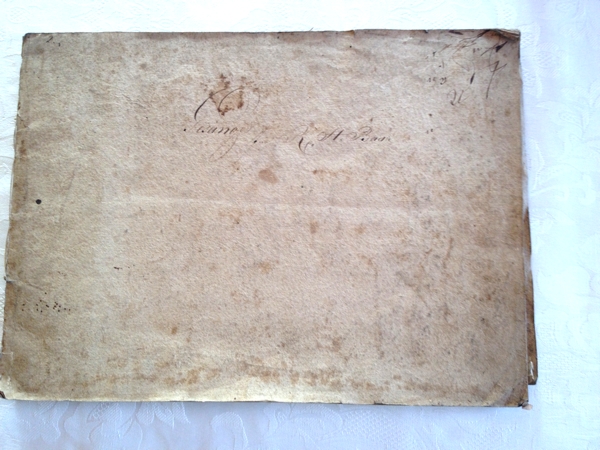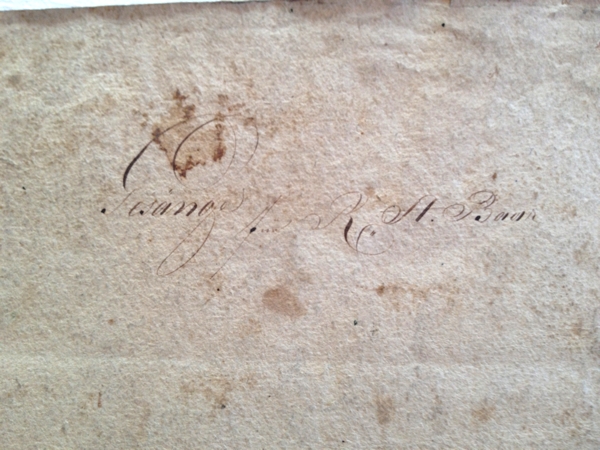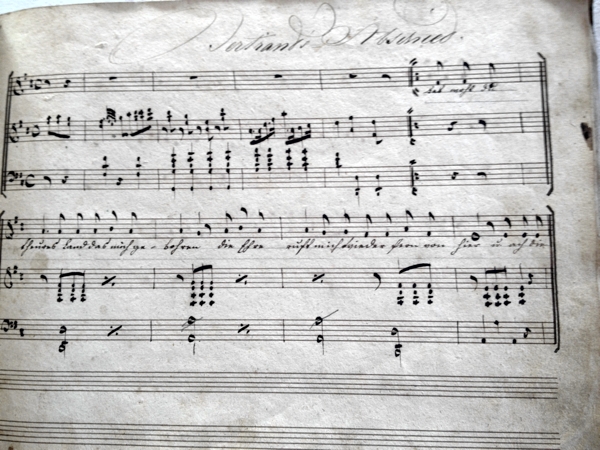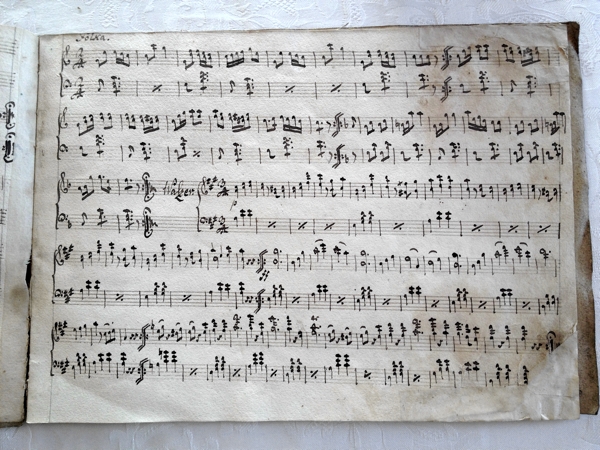So we’ve hit a stretch of 5-6 on the LSCA. We will survive.
I should have something to show tomorrow. But not today. It’s gross.
Creating something every day for 365 days
When last we left Ariadne, she was explaining how
Today we get a little more: Theseus mentions his part in slaying the Minotaur, and Ariadne throws it in his face that he couldn’t have done it without her telling him the secret of getting in and back out again.
From here, I think we’re going to get a little interpolated text, just a little something for Ariadne and Theseus to sing before she launches into her I LOVE YOU DAMMIT bit.
I would like to state for the record that the piddling amount that is new in today’s selection represents days of my writing stuff that went absolutely nowhere, and you will notice that Ariadne’s last bit is still in the boogie-woogie style we started with. Next section, pretty music. I swear.
Dream One, “My mother, bored and pampered” | score (pdf) | mp3
Here in the fourth scene of “Dream One” of Seven Dreams of Falling, we have Ariadne leading the way in a rather expository passage, i.e., the background of the Minotaur myth. As she and Theseus trade pointed viewpoints about their roles in the story, it seems to me that we might want some kind of operatic give-and-take, if not an outright duet. And it might still be an outright duet.
I can’t tell at this point, given that I’m treading water with the passage. I have put a few tentative notes up on the screen, but nothing is appealing to me or making sense yet. (For those who don’t know, I work in files that are labeled ‘Abortive Attempts,’ i.e., “4. Hark, abortive attempts,” where I simply abandon stuff that doesn’t work, insert new measures, and keep going. Often I will find later that some of the abandoned material fits right in with the stuff that works.)
So nothing to report today, music composition-speakingwise.
So I’ve been roped into teach a weeklong workshop down at Newnan Theatre Company—thanks, Robbie Kirkland—for middle schoolers. The ostensible topic is “character development,” and the theme is “Villains.” Bwahaha, and all that.
Actually, not bwahaha at all. It’s “character development,” and I’m not spending a week teaching kids how to twirl their mustaches. Just the opposite in fact. We’re going to develop two villains each, one Disney-esque/cartoony, the other “real life,” e.g., the mean girl at school, the snotty boy down the street, etc.
Mainly we’re going to learn that none of these people think they’re evil. They just want certain things and they have their own ways to go about getting them.
Anyway, we spend Monday through Thursday working on material, and then on Friday is the obligatory show for the parents. It will be interesting to see what we come up with. (Panel discussion about public misperceptions? The Dating Game? The mind boggles.)
I got home from our meeting at the theatre, and for some reason the idea of an opening number just seized me.
Presenting, “Not Really Bad: a song for villains,” words and music by Dale Lyles | score (pdf) | mp3
It is totally adorable, you guys. (And yes, 3 hours start to finish—how kind of you to ask.)
Yesterday I was sleep deprived from my torn rotator cuff bugging me all night, and I was so zombified that I didn’t really get any composing done. I took a stab at it, but the results are more than likely not going to survive. I’m piddling away at the text today, and my main struggle is deciding where Ariadne is heading in this section.
First instinct is to sustain her caustic bitch act. Second instinct is to let her reveal how much she really loved Theseus and expected to live happily ever after with him. I’d also like to show Theseus’s ambivalence about this history.
In other words, time for some pretty music.
More work is required.
I’m taking my time with this scene, so don’t expect a lot of results right away. Of the fourteen pages of the libretto for “Dream One,” six and a half of them are the control room scene. So it’s long and it’s complicated, and it’s going to take a while to nail down. (I’ve already tackled part of it, in Ariadne’s bit about her mother.)
Today I just began throwing notes around to see if I could develop anything that might be useful later on, and actually I think I have something.
I’m thinking of it as my “machine” fragment. There are two segments of the scene where the characters offer competing views of what their machines are for, one of which leads into a reprise of “Let us joyfully gaze” with the chorus. Besides those two segments, I could use the motif to transition from Icarus’s aria into the control room, i.e., scene change music.
At any rate, I succeeded in whacking out nearly 30 seconds of music, which is not bad for a shortened work session this morning. It’s something to play with.
“Machine fragment” | mp3
It occurs to me that I have yet to let loose with a waltz of any sort. Hm.
My lovely first wife returned from Virginia recently with another box of old stuff from ancestral sources, and one of the items was an ancient music notebook.

It’s 12″ wide x 9″ tall, and everything in it is completely handwritten. It seems to be two notebooks bound together.
Here’s what is written on the cover:

“Gesänge für R. A. Bxxx.” “Songs for R. A. someone…”
There is no date anywhere in, and it’s all in German. There are two pages which seem to be lyrics, written in the same beautiful hand, and one of those is in French. The lyrics page in German is almost completely illegible.
There are two songs and around twenty piano pieces, all dances like galops, waltzes, ländler, and polkas. There is a set of five contradanses near the end.
There are many blank pages.

Titles, if present, are written in either the florid script you see above or some neatly penned fraktur script.
I have not yet played through the book yet, but a cursory glance reveals no overtly famous pieces. None of the pieces are attributed to a composer. There are more than a few corrections in pencil and in ink.
So is this a copybook that someone was making for a friend or loved one, or is it like Bach’s Notebook for Anna Magdalena, original compositions?

I’ll report back if I find anything interesting.
update:
One of the pieces was titled “Schwarzenbacher-Galopp,” and I was able to track that down to The Universal Handbook of Musical Literature, published in 1907. It’s listed under the works of one Wenzel Schwarz, born in 1830, and that’s all I can find about the man. [To give you the full nerdgasm, I actually found the piece in this version of the Handbook; otherwise, I might have missed Wenzel’s entry. Both are scanned; neither are edited.]
So it seems that at least some of the works are copied, although one of the pieces I played through had some blatant harmonic missteps, given the simplistic nature of dance music of the time. Could have been a copying error.
And here’s another one: “C. M. von Webers lezter [sic] Gedanke,” found here. It’s the exact piece in the notebook. So this is a copybook.
One more: “Lied aus Czaar und Zimmermann,” by one Albert Lortzing.
All in all, I’m dating this thing to the late 19th century, when individuals would still be interested in these dances. This easily could have been someone’s g0-to book for impromptu dances at home or with friends.
So that was fun. I suppose I should get back to analyzing the libretto for the last scene in “Dream One.” Or something.
Well, that wasn’t so hard, was it?
I’m posting this, although I am under no illusion that it’s finished. There are passages that I know are going to get changed; I just feel it.
However, for the time being, Icarus’s first dream aria, “I am alone,” is complete.
After the confident glories of the first two numbers, Icarus cannot stay out of tonal ambiguity. He is happy to be where he is, and he believes that. However, his accompaniment is not so sure; it confronts him with doubts and forces him to contemplate that perhaps this gig is not all it’s cracked up to be.
I look forward to the projection designer’s solutions to Icarus’s flight.
Note: I changed the vocal line to a French horn in order to check a couple of notes, and I left it that way. It’s actually clearer and keeps me hearing an operatic tenor rather than that fuzzy little synth voice thing.
Here’s the thing: I’m really stuck on the “bridge” portion of the text of Icarus’s first dream aria.
Since one cannot just write climax after climax—well, one could, but that would make one Andrew Lloyd Webber—there must be therefore passages in the piece where the tenor gets to back off a bit. Remember, he’s suspended 20-30 feet above the stage doing God only knows/what the budget will allow. And shirtless, I’m sure.[1] Give the man a break.
Since Scott’s text is not regularly metrical, although fairly iambic in the main, that means it will need to “float” above the accompaniment, quasi-recitative, and that’s where I’m having problems. The main feel of the aria is whole and half notes in the accompaniment and quarter notes in the vocal line—all drawn out and soaring. I can keep that going, as I’ve mentioned before, by using the cello line from the opening “I am alone” part, but when I try to put the text in above that using anything but quarter notes (for variety), it sounds wrong. Also, it starts to turn into that plague of modern opera, pointillism. I know, I know, sometimes you just gotta churn through the words to get to the pretty part, but I would love for my stuff to make sense.
The real problem, I think, is that I haven’t gotten that cello line to lie down and behave. It keeps wanting to turn itself into a heroic climax, and it doesn’t need to. It shouldn’t. It should just burble along underneath Icarus until we get back to the next recognizable motif. WHAT IS IT ABOUT “BRIDGE PASSAGE” THAT YOU DON’T UNDERSTAND, CELLO LINE?? HENGH???
As you can probably tell by now, I’m procrastinating.
—————
[1] This tendency to strip our tenors and baritones is an interesting trend in modern opera; there’s even a website about it. People who discuss the objectification of the female body (viz, Deborah Voigt) in opera don’t give a lot of thought to the fact that as far as I can tell Nathan Gunn has never done a show fully clothed.
It occurs to me that I have never uploaded what may or may not be the finished “Your Beauty,” the art song I wrote for John Tibbetts, the wonderful young baritone from Georgia State. John was a Social Studies major at GHP in 2008 and for some reason decided I would make an adequate mentor/friend for his youth. Well, better than Socrates, I suppose.
Anyway, for two years I’ve been promising him a song for his senior recital, and since he’s now making decisions about that performance for next year, it was time for me to put up or shut up.
I scribbled a mad text, and then had a horrific time making it work. It was at least a 6 on the LSCA. And I’m not sure it works. Neither is John, so we’re even. I’ve made him promise to dig into it and report back from his lofty perch at the Central City Opera Summer Festival. If it can be fixed, so; if not, I’ll try again with something different. (The third possibility, that it just works, has not really occurred to me.)
The problem is with the middle section, when the text breaks down along with the narrator’s thought process. The narrator is musing to his lover that she is so beautiful that he feels he’s never really seen or touched her, just her beauty. The idea drives him slightly insane there in the middle until he reaches what seems to be a startling conclusion for him. And before anyone objects to that passage, I’d like to point out that the baritone in question asked for that F#. So there.
The sheerly technical problem with the center section is that the computer can play eighth notes only in rhythm. It can’t, as John and an accompanist would do, break free of the meter and let the notes/words rush out in a torrent, only to be pulled up short by the “full value” segments. The computer can’t sound crazy. It can’t sound as if it’s having an orgasm. (No, I don’t know whether John can either, so shut your filthy mind you pervert. Yes, Jobie, I’m looking at you.)
So there are my misgivings. Comments in the comments.